AWM41 991 - [Nurses Narratives] Sister R Kirkcaldie
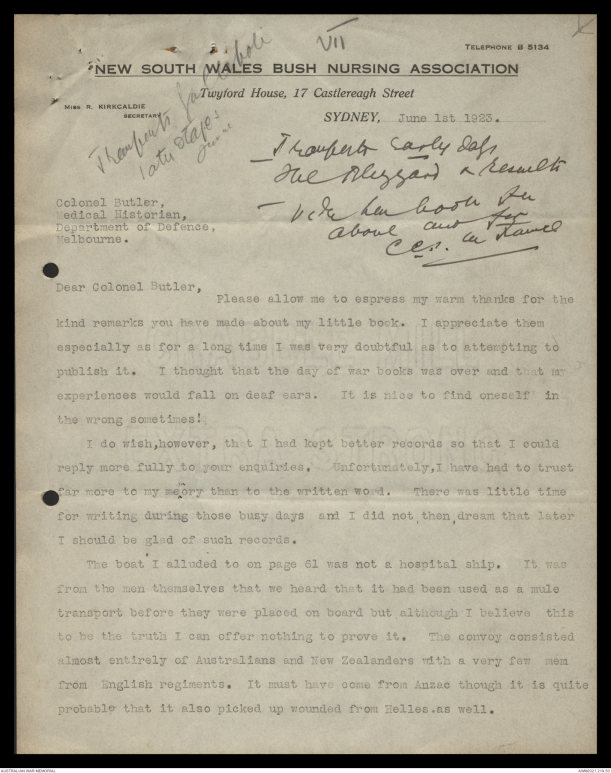
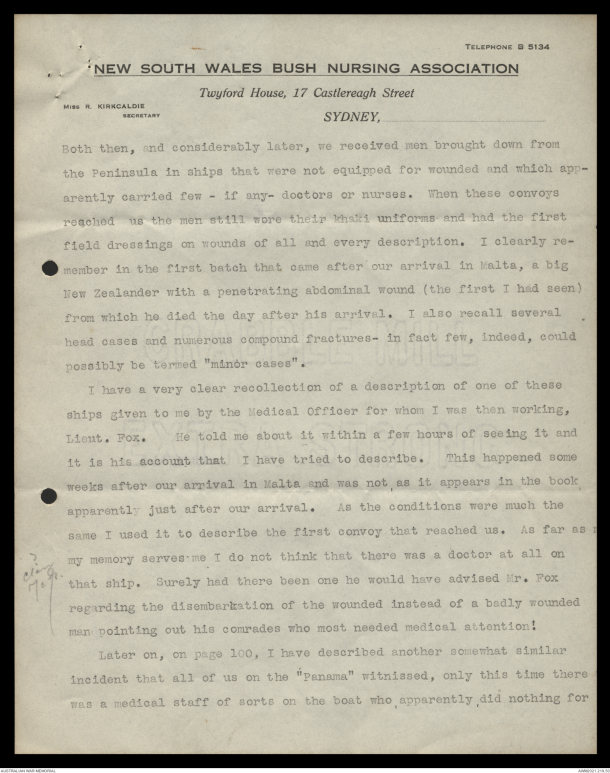
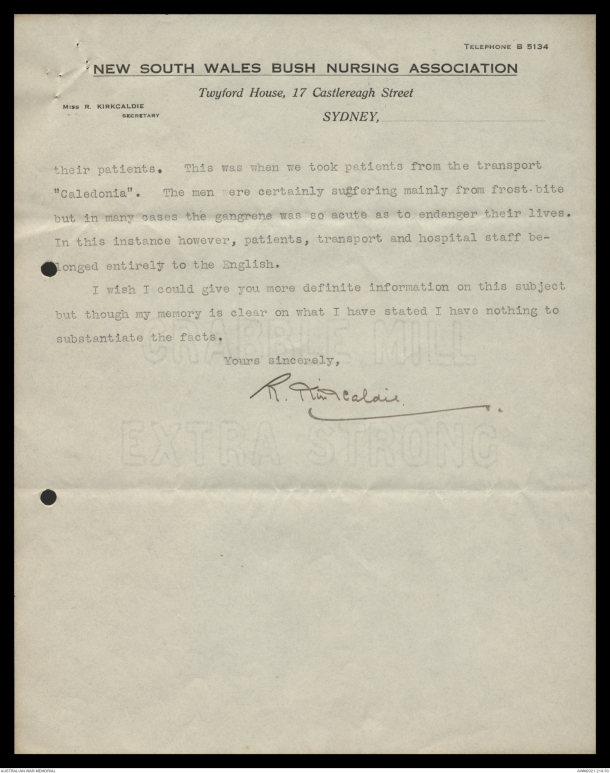
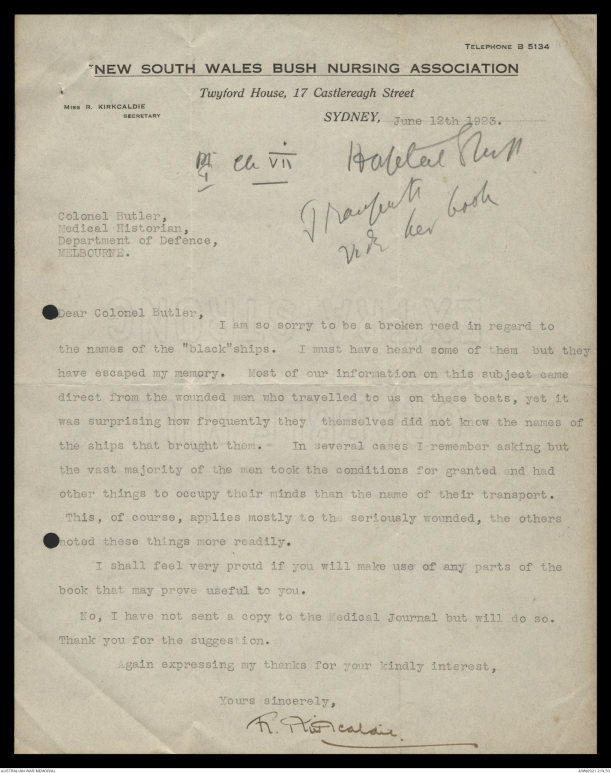
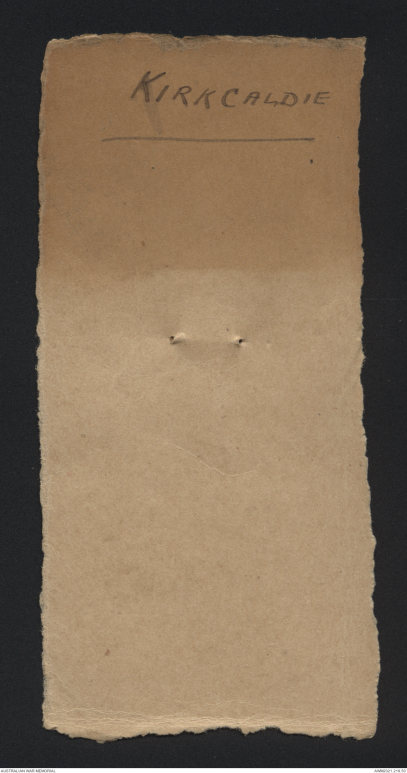
[*VII*]
TELEPHONE B 5134
NEW SOUTH WALES BUSH NURSING ASSOCIATON
Twyford House, 17 Castlereagh Street
Miss R. KIRKCALDIE
SECRETARY
SYDNEY, June 1st 1923.
[*Transports Gallipoli
later stages
[[France]]*]
[*-Transports early days
The blizzard & results
- [[?take, use]] her book for
above and for
CC.S. in France *]
Colonel Butler,
Medical Historian,
Department of Defence,
Melbourne.
Dear Colonel Butler,
Please allow me to espress my warm thanks for the
kind remarks you have made about my little book. I appreciate them
especially as for a long time I was very doubtful as to attempting to
publish it. I thought that the day of war books was over and that my
experiences would fall on deaf ears. It is nice to find oneself in
the wrong sometimes!
I do wish,however, that I had kept better records so that I could
reply more fully to your enquiries. Unfortunately, I have had to trust
far more to my me^mory than to the written word. There was little time
for writing during those busy days and I did not, then, dream that later
I should be glad of such records.
The boat I alluded to on page 61 was not a hospital ship. It was
from the men themselves that we heard that it had been used as a mule
transport before they were placed on board but although I believe this
to be the truth I can offer nothing to prove it. The convoy consisted
almost entirely of Australian and New Zealanders with a very few men
from English regiments. It must have come from Anzac though it is quite
probable that it also picked up wounded from Helles. as well.
TELEPHONE B 5134
NEW SOUTH WALES BUSH NURSING ASSOCIATON
Twyford House, 17 Castlereagh Street
Miss R. KIRKCALDIE
SECRETARY
SYDNEY,______
Both then, and considerably later, we received men brought down from
the Peninsula in ships that were not equipped for wounded and which apparently carried few - if any- doctors or nurses. When these convoys
reached us the men still wore their khaki uniforms and had the first
field dressings on wounds of all and every description. I clearly remember
in the first batch that came after our arrival in Malta, a big
New Zealander with a penetrating abdominal wound (the first I had seen)
from which he died the day after arrival. I also recall several
head cases and numerous compound fractures- in fact few, indeed, could
possibly be termed "minor cases".
I have a very clear recollection of a description of one of these
ships given to me by the Medical Officer for whom I was then working,
Lieut. Fox. He told me about it within a few hours of seeing it and
it is his account that I have tried to describe. This happened some
weeks after our arrival in Malta and was not, as it appears in the book
apparently just after our arrival. As the conditions were much the
same I used it to describe the first convoy that reached us. As far as
my memory serves me I do not think that there was a doctor at all on
[*Cluny? 7?] that ship. Surely had there been one he would have advised Mr. Fox
regarding the disembarkation of the wounded instead of a badly wounded
man pointing out his comrades who most needed medical attention!
Later on, on page 100, I have described another somewhat similar
incident that all of us on the "Panama" witnissed, only this time there
was a medical staff of sorts on the boat who, apparently, did nothing for
TELEPHONE B 5134
NEW SOUTH WALES BUSH NURSING ASSOCIATON
Twyford House, 17 Castlereagh Street
SYDNEY, ____
Miss R. KIRKCALDIE
SECRETARY
their patients. This was when we took patients from the transport
"Caledonia". The men were certainly suffering mainly from frost-bite
but in many cases the gangrene was so acute as to endanger their lives.
In this instance however, patients, transport and hospital staff belonged
entirely to the English.
I wish I could give you more definite information on this subject
but though my memory is clear on what I have stated I have nothing to
substantiate the facts.
Your sincerely,
R. Kirkcaldie.
TELEPHONE B 5134
NEW SOUTH WALES BUSH NURSING ASSOCIATON
Twyford House, 17 Castlereagh Street
Miss R. KIRKCALDIE
SECRETARY
SYDNEY, June 12th, 1923
[*[[M?]]
[[G?]] Ch Vll*]
[*Hospital stuff
Transports
vide[via?] her book*]
Colonel Butler,
Medical Historian,
Department of Defence,
MELBOURNE.
Dear Colonel Butler,
I am so sorry to be a broken reed in regard to
the names of the "black" ships. I must have heard some of them but they
have escaped my memory. Most of our information on this subject came
direct from the wounded men who travelled to us on these boats, yet it
was surprising how frequently they themselves did not know the names of
the ships that brought them. In several cases I remember asking but
the vast majority of the men took the conditions for granted and had
other things to occupy their minds than the name of their transport.
This, of course, applies mostly to the seriously wounded, the others
noted these things more readily.
I shall feel very proud if you will make use of any parts of the
book that may prove useful to you.
No, I have not sent a copy to the Medical Journal but will do so.
Thank you for the suggestion.
Again expressing my thanks for your kindly interest,
Yours sincerely,
R. Kirkcaldie.
KIRKCALDIE
 Sue Ballyn
Sue BallynThis transcription item is now locked to you for editing. To release the lock either Save your changes or Cancel.
This lock will be automatically released after 60 minutes of inactivity.